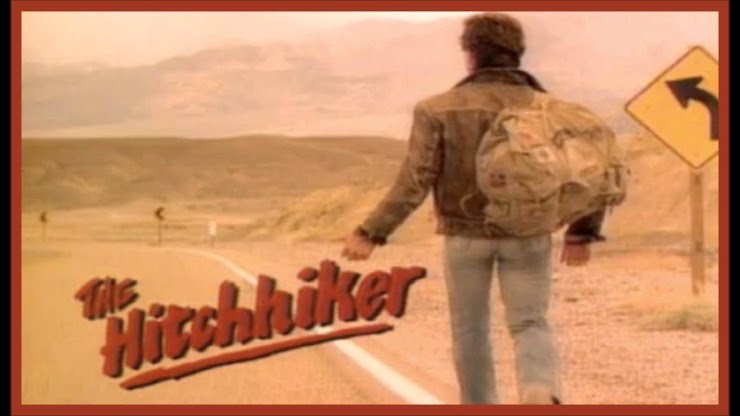Down The Road
As established in my initial overview of the show’s first season, The Hitchhiker was a mixed bag of a show, originating as a dry run of William Gaines adaptations (before HBO launched Tales From the Crypt a number of years later) and continuing on as uneven showcase of softcore erotica, crime, suspense and occasional genre elements (mostly in operating in a Twilight Zone/Tales of the Unexpected “twist ending” mode – Wikipedia refers to it as a “mystery/horror” anthology but that doesn’t seem exactly on point for either). The second season offers more of the same, mostly, but with a few interesting additions, even as it plods along its well-worn path.
As always, Page Fletcher (who “IS the Hitchhiker,” the credits assure us) trudges onto screen at the start and finish to proclaim portentous and pointed observations, cutting the time and writing concerns that dog a 30 minute anthology show attempting to set up character and plot as quickly as possible. This time around, our sullen Serling stand-in has been given a slightly remixed end theme, and while the show hasn’t fully embraced its reputation-yet-to-come as a reliable source of sex, you can begin to see those beats becoming more frequent – often, if not always, there’s going to be nudity starting somewhere around the 11 to 14 minute mark.
At its best, this season of The Hitchhiker features interesting attempts to stretch beyond its usual storytelling limits, this time including some monsters, demonic curses, and slightly atypical (if still familiar) plots. There are even some big-name directors, as well as some notable stars. At its worst, the show often wastes precious time NOT telling a story at all, marking the minutes until a steamy encounter or plodding to an obvious ending. Still, you pay your money and takes your chances…
The season’s shallow end consists of episodes like “Man Of Her Dreams” (in which a paranoid loans manager at a bank beginning a new relationship starts to have violent psychic flashes of the local serial killer’s exploits), “W.G.O.D.” (which features Gary Busey as a radio preacher with a dark secret in his past who finds himself plagued by mysterious, mocking calls to his show), “Dead Man’s Curve” (a woman who writes steamy novels returns to her home town to find some of the populace upset) and “Man’s Best Friend” (a delusional guy, following a break-up, finds himself befriended by a vicious dog who seems to kill his “enemies”) all end exactly as you expect, with no surprises. Which is a shame, because they all feature minor elements of note, whether it’s the surprisingly vicious murder scenes in “Dreams,” the “right to life” rally and effective imagery of bleeding microphones (which then proceed into silly visual overkill) in “W.G.O.D,” or the fact that “Dead Man’s Curve,” despite featuring Michael Ironsides and being directed by noted erotic filmmaker Roger Vadim, is so astonishingly lackluster – mostly due to the poor writing.
While the show never really rises above merely adequate in this season, there are a nice variety of approaches on offer. The show embraces its ability to tell a punchy little suspense story in three episodes. The weakest is “Ghostwriter,” in which failed author Jeffery Hunt (a young Willem Dafoe) fakes his own death to increase his sales potential, but uncovers his wife’s affair with his manager in the process. This struck me as an attempt to cram an entire twisty noir thriller film into a half hour. “Last Scene,” directed by Paul Verhoeven (just before his break out with Robocop), has an actress with limited skills threatened by a stalker patterned on the one in the film she’s making. It’s not amazing or anything but does feature one of the show’s few positive endings (as well as a climax set at an embarrassingly “edgy” Hollywood nightclub). Finally, “The Killer” – in which a wealthy young woman who uses a wheelchair discovers her whole family murdered by shotgun – is a very effective little suspense scenario that only falters at the end, when it succumbs to the need to provide a “twist ending.”
Equally interesting, if only just satisfying, are the three episodes that indulge in slightly more dream-like or allegorical approaches. “Out Of The Night” begins with a mysterious young man, fleeing some trauma and pursued by unknown individuals, choosing to hide out at the Hospitality Inn, where he meets an enigmatic stage magician (Kirstie Alley) and runs into some trippy scenarios before finding himself roped into a magic “trick” at the climax. Sure, it’s yet another variation on a familiar Bierce tale, but it holds your attention. “One Last Prayer,” while nothing to write home about, is a satisfyingly hokey encapsulation of early 1980s music video/MTV culture in which a talented songwriter reinvents herself as a new wave vixen to further her career, throwing away her scruples until she finds herself haunted by her own music video doppelgänger. It’s silly, sure… but some guilty fun. Finally, “O.D. Feelin’” follows a bag of wayward drugs traversing its way through the city’s seedy underbelly, each individual killing or dying in turn to possess it, as it makes its way back to Mr. Big (Gene Simmons). With characters named “The Fool,” “The Wise Man,” & “The Chemist” (portrayed by such notable talents as Sarah Bernhardt and Joe Flaherty), this allegory’s nonsensical ending makes its point obvious, but is unlike anything else done on the show so far.
As I said, even the best of the episodes here are merely adequate, but they do showcase how the show was trying to embrace other approaches. Body horror, an unexpected monster, and demonic evil each feature in this season’s three “best” episodes. “The Curse” has a callow young rich man, essentially a slumlord, learn his lesson about exploiting the poor after he awakens from a tryst to find himself tattooed with a snake image that keeps growing – effectively nasty! A sadistic female nurse (Margot Kidder) working the “Nightshift” is not above robbing her elderly charges of trinkets for her criminal boyfriend, but finds this habit causes some problems when a mute and unresponsive old man (TV stalwart Darren McGavin, in an entirely wordless role) is admitted wearing a bejeweled ring. Finally, Tom Skerritt appears as a troubled investigator trying to find out why an elderly priest committed suicide in an abandoned (and cursed) convent in “True Believer.” This episode, while not completely successful, has a number of interesting touches, including a reuse of the evangelical radio broadcasts from “W.G.O.D.,” Ornella Muti (Princess Aura from Flash Gordon) as a mysterious nun, and an ominous and brooding mood, which includes the suicidal opening, demonic breathing, and some fish-eye lens effects. As a “spooky” episode of a fairly predictable anthology show, it ain’t half bad!
But, that “adequate” aspect needs to be addressed. This early in, The Hitchhiker already feels like it’s in a holding pattern, providing just enough sex, nudity, and weak twist endings to fill the remit, without really showing us much of anything particularly noteworthy. As I said, if and when I return to this show, it may be at a more accelerated pace unless it really starts hitting some stories out of the park (to mix a metaphor). Until then, keep an eye out for a weather-beaten dude making ominous pronouncements about your character – things may get mildly interesting for the next 30 minutes!
This post was written for Nightfire in partnership with Pseudopod.



